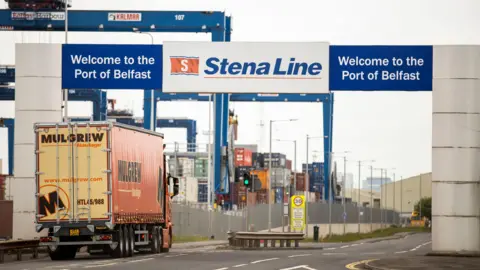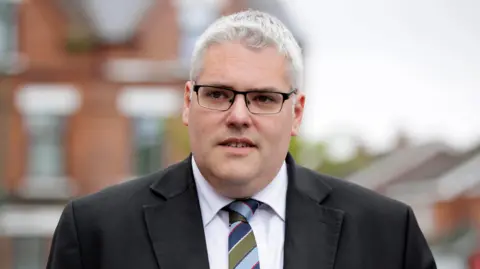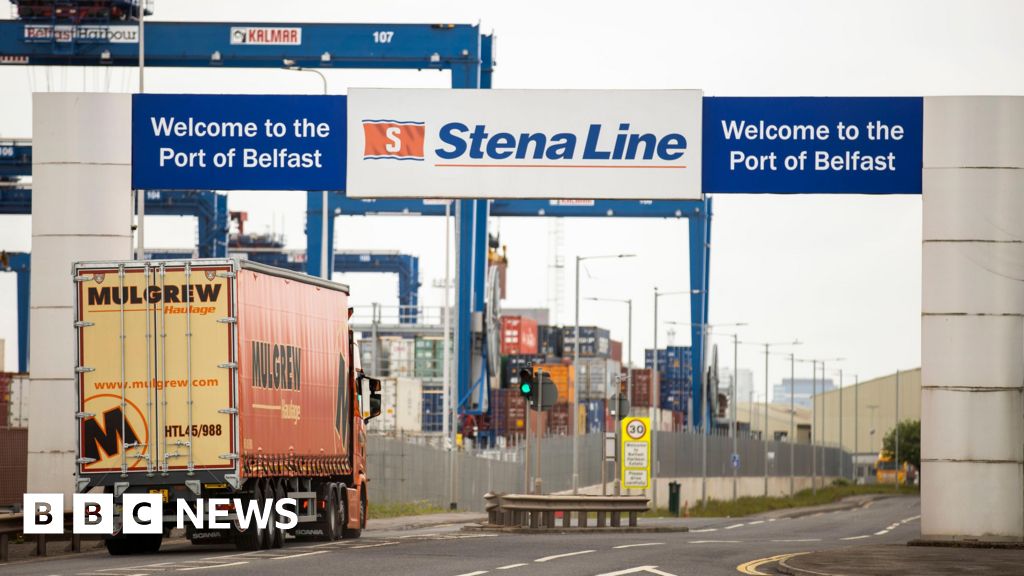 PA Media
PA MediaIn 2019 Boris Johnson fought and won a UK general election with the slogan “Get Brexit Done”.
It was a bet that voters were fed up with years of exhausting political drama and wanted the government to cut a deal and move on.
It took until 2024 for Brexit to finally ‘get done’ in Northern Ireland.
The Democratic Unionist Party (DUP), the largest unionist party, reached a grudging accommodation with the arrangements negotiated between the EU and UK.
Those arrangements preserve an open goods border between Northern Ireland and the Republic of Ireland, at the cost of new controls on goods coming from the rest of the UK.
The DUP ended its two-year boycott of devolved government in early 2024 and with Stormont back Brexit was no longer at the centre of local politics.
A vote by the Stormont Assembly at the end of December means that the special Brexit deal for Northern Ireland will continue to apply for at least another four years.
Brexit remains an issue to be sensitively managed and a series of problems to be solved but most of the political heat has gone.
Even when unionist parties triggered the Stormont Brake in an attempt to block a new EU regulation from applying in NI it was met with a low-key response from nationalism and the UK government.
An Irish Sea border remains, albeit in a modified and simplified state compared to the original 2019 deal.
The DUP returned to the NI Executive in February having agreed the Safeguarding the Union paper with the UK government.
That was largely a repackaging of 2023’s Windsor Framework, which sought to simplify the processes for moving goods from Great Britain to NI.
It was Sir Jeffrey Donaldson’s deal and he boasted that it would take away the post-Brexit border between GB and NI.
After the shock of Donaldson’s arrest and resignation in March, his successor conceded that the deal had been oversold and the Irish Sea border still exists.
 PA Media
PA MediaIn June, DUP leader Gavin Robinson told his party: “We will continue to fight to fully restore Northern Ireland’s place within the United Kingdom, including removing the application of EU law in our country and the internal Irish Sea Border it creates.”
But there was no suggestion that the fight would involve another Stormont walk out.
The sense that the Brexit era was ending also came with the decisions of Leo Varadkar and Simon Coveney to leave elected politics in 2024.
As taoiseach (Irish prime minister) and foreign minister they had steered Ireland’s Brexit response.
They achieved their objectives of keeping an open border with NI and preserving Ireland’s place in the EU single market.
That earned them tributes from nationalist politicians in NI but many unionists were critical of their legacy, accusing them of misrepresenting and damaging the Good Friday Agreement.
 Getty Images
Getty ImagesIn some respects Brexit in Northern Ireland is not quite done yet because the Windsor Framework is still to be fully implemented.
New customs processes for parcels and freight, which were due to apply at the start of October 2024, have been delayed until March 2025 at the earliest.
It is also still not clear what the final arrangements will be for supplying veterinary medicines to NI.
Border checks
One potential solution to the vet medicines issue and much else is for a revised, overarching deal between the UK and EU.
The prospects of that increased as Labour swept to victory in July’s UK general election.
One of the party’s manifesto commitments was to seek a new agreement for agri-food products traded between the UK and EU with the aim to “eliminate most border checks created by the Tory Brexit deal”.
Such a deal could – at a stroke – sweep away the most obvious physical impacts of the post-Brexit Irish Sea border between GB and NI.
In simple terms, if a new deal ends checks on goods moving from Dover to Calais then checks will also end from Cairnryan to Belfast.
The prime minister appointed Nick Thomas-Symonds as his new EU point man and on an early visit to NI he said he was seeking an “ambitious'” deal.
What exactly is being sought by the UK and what might be on offer from the EU has since proved difficult to discern.
Negotiations should get under way in the spring, at which point it should become clearer what the next chapter of UK-EU relations will look like for Northern Ireland.


